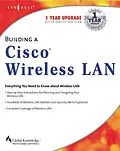Enable enterprise-wide information access using Cisco wireless networksWireless networks are rapidly becoming a viable alternative to traditional wired LANs (Local Area Networks), mainly because of the convenience they provide. By implementing a wireless network, companies eliminate the need and expense of installing fixed cables, outlet ports or patch panels. Building a Cisco Wireless LAN is for individuals designing and supporting a Cisco wireless LAN. The book contains detailed information on the process for the thorough and accurate network design for the Cisco 340, 350, and UBR 7200 series. The contains detailed information on the configuration and troubleshooting of a Cisco WLAN installation. The book offers an introduction to wireless technology from the fundamental principles to the actual implementation.The first book for Cisco LAN users looking to upgrade to a wireless networkIdeal for Network administrators looking into wireless network technology for the first time
Klappentext
Enable enterprise-wide information access using Cisco wireless networks
Wireless networks are rapidly becoming a viable alternative to traditional wired LANs (Local Area Networks), mainly because of the convenience they provide. By implementing a wireless network, companies eliminate the need and expense of installing fixed cables, outlet ports or patch panels.
Building a Cisco Wireless LAN is for individuals designing and supporting a Cisco wireless LAN. The book contains detailed information on the process for the thorough and accurate network design for the Cisco 340, 350, and UBR 7200 series. The contains detailed information on the configuration and troubleshooting of a Cisco WLAN installation. The book offers an introduction to wireless technology from the fundamental principles to the actual implementation.
The first book for Cisco LAN users looking to upgrade to a wireless network
Ideal for Network administrators looking into wireless network technology for the first time
Inhalt
Foreword
Chapter 1 Introduction to Wireless Local Area Networks
Introduction
Reviewing Networking Basics
Defining Topologies
CSMA/CD versus Deterministic Access
Understanding How Wireless Fits into the OSI System Model
Tracking Data through the OSI System Model
Review of TCP/IP Basics
Understanding TCP/IP Addressing
Summary
Solutions Fast Track
Frequently Asked Questions
Chapter 2 Wireless LAN Overview
Introduction
Understanding the Fundamentals of Radio Frequency
Wireless Radio Signal Transmission and Reception
Frequency
Bandwidth
Modulation
Communicating with Wireless LAN Technologies
Microwave Technology
Infrared Technology
Spread Spectrum Technology
Implementing a Wireless LAN Architecture
Logical Wireless System Components
Physical Wireless System Components
Keeping Pace with Wireless Networking Standards
Institute of Electrical and Electronic Engineers (IEEE)
European Telecommunications Standards Institute (ETSI)
Summary
Solutions Fast Track
Frequently Asked Questions
Chapter 3 Cisco Wireless LAN Product Line
Introduction
Overview of Cisco Wireless Systems
Cisco's WLAN Product Line
Using WLANs for Individual User Connectivity
Using WLANs to Connect Campuses
Cisco's Aironet 3X0 Series APs and Bridges
The Cisco Aironet 350 Series
Features of the Cisco Aironet 340 Series
Cisco's Aironet Wireless NICs
Cisco Aironet Antennas
Ceiling Mount Omni-Directional Antenna
Mast Mount Omni-Directional Antenna
High-Gain Mast Mount Omni-Directional Antenna
Pillar Mount Diversity Omni-Directional Antenna
POS Diversity Dipole Omni-Directional Antenna
Diversity Ceiling Mount Omni-Directional Patch Antenna
Directional Wall Mount Patch Antenna
Diversity Directional Wall Mount Patch Antenna
Yagi Antenna
Dish Antenna
Summary
Solutions Fast Track
Frequently Asked Questions
Chapter 4 Wireless Network Design
Introduction
Wireless Planning Considerations
Wireless Benefits and Limitations
Mobility
Throughput versus Data Rate and Load
Cost and Return on Investment
Wireless Design Considerations
Attenuation
Accounting for the Fresnel Zone and Earth Bulge
Radio Frequency Interference
Application Considerations
Structural Considerations
Andromeda Manufacturing Rough Design
Performing a Wireless Site Survey
Preparation
Infrastructure Awareness
Preparing a Site Survey Kit
Performing an Interior Wireless Site Survey
Performing an Exterior Wireless Site Survey
Wireless Design Examples
Warehouse Design Example 1
Warehouse Design Example 2
Warehouse Design Example 3
Retail Design Example
Education Design Example 1
Education Design Example 2
Point-to-Point Design Example 1
Point-to-Point Design Example 2
Point-to-Point Design Example 3
Summary
Solutions Fast Track
Frequently Asked Questions
Chapter 5 Installation and Configuration of Cisco 340 and Cisco 350 Series Access Points
Introduction
Installation of the Cisco 340/350 Series AP
Specific Differences of the Cisco 350 Series AP
Power Requirements
Network Connectivity
Initial Configuration of the Cisco 340 and 350 Series AP
IP Setup Utility
Terminal Emulator Setup
Web-Based Configuration of the Cisco 340 and 350 Series APs
Configuring the Cisco 340 and 350 Series APs
Troubleshooting the Cisco 340 and 350 Series APs
Web-Based Configuration of the Cisco 340 BSE/BSM Series AP
Configuring the Cisco 340 BSE/BSM Series AP
Summary
Solutions Fast Track
Frequently Asked Questions
Chapter 6 Installation and Configuration of Cisco Aironet Bridges
Introduction
Understanding the Role of Traditional Network Bridges
Comparing Traditional Bridges with Wireless Bridges
Installation of the Cisco Aironet Bridge Unit
Installing the Antenna
Configuring the Network Port
Configuring the Console Port
Applying Power
Working with Root and Non-Root Modes on a Wireless Bridge
Overview of the Spanning Tree Protocol
Initial Setup of the Cisco Aironet Wireless Bridge
Configuring the Bridge Using the Command-Line Interface
Configuring the Bridge Using the Command Menus
General Configuration Recommendations and Notes
Performing the Initial Configuration
Operational Configuration of the Cisco Aironet Wireless Bridge
Console Access
Telnet Access
Web Browser Access
Using the Cisco Aironet Wireless Bridge Radio Main Menu
Configuring the Ethernet Port
Configuring the Network Identifiers
Console Management Access
Configuring the Time Service
Setting Up Association Tables
Using Filters
Event Logging
Viewing Statistics
Throughput Option
Radio Option
Ethernet Option
Status Option
Map Option
Watch Option
History Option
Node Option
ARP Option
Display Time Option
Ipadr Option
Cisco Aironet Wireless Bridge Troubleshooting
Network Menu O…
